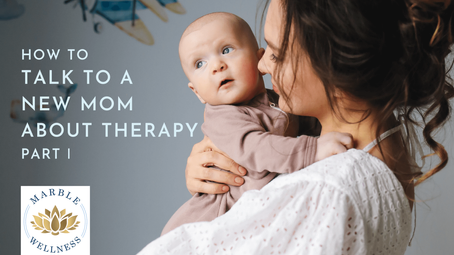
When someone close to you has a baby, it’s an exciting time for everyone. You may be eager to soak up some baby snuggles, gush about the tiny clothes, and melt when that precious baby squeezes your finger. It’s true that new babies bring joy into the world, and sharing that happiness with new moms in your family or social circle can be an amazing experience for you both.
But life with a newborn does not always feel rosy, despite what social media leads us to believe.
Moms commonly experience “baby blues” for the first two weeks after their baby is born. Feelings of overwhelm can rock a new parent’s confidence. Exhaustion from nighttime feedings takes a toll on both physical and mental health. Even in the best cases where moms have lots of support, this phase of life is hard. When parents don’t have as much support, it’s even more challenging.
When someone close to you – your friend, your sister, your coworker – has a baby, part of the support you can provide can be looking for signs about how she’s really doing. As the weeks pass from her birth, it’s helpful to look for clues about her mental health. Does she laugh at things that used to make her laugh? Is she still interested in things that have always interested her (even if she’s not able to dedicate time to those things right now)? Is she eating? Sleeping when she can?
If you notice signs that concern you about a mom’s mental or emotional health, know that you alone don’t have to figure out how to provide support.
Postpartum therapy can be a helpful tool for new moms to navigate the postpartum period.
Whether a mom is showing signs of a perinatal mood and anxiety disorder or is just having a tough time moving through the routine challenges of having a newborn, a maternal mental health therapist can be a great resource for support.

Our St. Louis therapists offer some strategies for how to best suggest counseling to a new mom:
1. Consider the day and time you’re talking to a new mom about starting therapy.
If she is someone you see at a variety of times, try to make the suggestion after she’s eaten, or at least had a minute to herself. Make sure distractions are minimized.
2. Bring up the idea of therapy gently.
Share your idea as a suggestion (sometimes it’s okay if it’s a firm suggestion!), but not with judgment, or in a black-and-white nature. It may seem obvious to you that therapy should be the next step for her, but after the birth of a new baby, it is almost surely not obvious to her.
3. Share your reasons for suggesting therapy to a new mom.
Make an out-loud observation of symptoms, the language the mom has used, or other concerns to demonstrate why you’re making this suggestion. People like to be seen, and recounting to people what you’ve noticed about them can feel really good, even if they don’t immediately lean into it. For example, you might say “I’ve noticed you’ve become really withdrawn, and talk about how badly you just want to understand if this gets better. You’ve also said you don’t have much of an appetite. I’m suggesting this because I don’t think you have to keep living that way. And you deserve to live better.”
4. Talk about how common PMADs (Perinatal Mood & Anxiety Disorders) are for new moms in St. Louis and everywhere.
Here are some PMADs facts that you might consider sharing, as a way to break down any stigma the new mom might be feeling, or even to breakthrough any sense of isolation (we all know the relief that can from the realization “Wait, so you mean I’m not the only one?!”):
- PMADS are the #1 medical complication related to childbearing
- 1 in 5 women experience a PMAD (this is a number based on “self-report” which means that 1 in 5 moms admit to a PMAD, and which means the real answer is probably closer to 1 in 4, or even 1 in 3!)
- PMADs are about more than anxiety and depression. It can also be:
- OCD
- PTSD (especially if there was a traumatic birth)
- Perinatal bipolar disorders
- Psychosis
If a woman is feeling like something is “off” but doesn’t identify with the symptoms of anxiety or depression, she can hear that other mental health issues can arise around pregnancy and postpartum and still (hopefully) feel like she isn’t alone.
- Also worth knowing if you are a supporter to the new parents: Dads can also get a PMAD! A PMAD can also be felt by an adoptive parent.

Stay tuned for our next blog post where we’ll share some additional strategies that can help you continue this conversation with a new mom. In the meantime, know that your support to a new parent is the best gift they could ever receive.
If you or a new mom you know is ready to start therapy, reach out to us at our Ballwin, MO counseling practice. We specialize in working with new moms and can help you feel supported as you move through this postpartum period.
Start Therapy for Mental Health in St. Louis
If you live in St. Louis and are ready to improve your mental health, we are here to help.
Contact Us!

Additional Counseling Services at Marble Wellness in St. Louis, MO
Counseling services designed to help set you on a path of living a more fulfilled, calm, and happy life. Our St. Louis team of therapists have a variety of training backgrounds and areas of expertise. We specialize in anxiety, depression, grief, chronic illness, therapy for men, couples, and maternal overwhelm. We can also help new moms with various postpartum concerns, moms in the thick of parenting, and moms with teens. We can also chat from wherever you are in the state with online therapy in Missouri and online therapy in Illinois. No matter where you are in your journey, we would love to support you.



